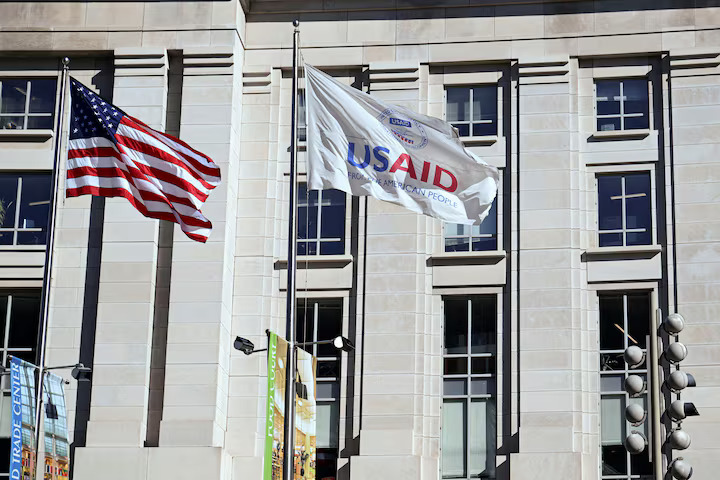Finnish American Heritage Center hosts grand re-opening

Garrett Neese/Daily Mining Gazette
Anne-Mari Paster, president of the Finlandia Foundation board, prepares to cut the ribbon at the reopening ceremony for the Finnish American Heritage Center Friday. The non-profit, which purchased the center and North Wind Books in January, has held several public events this week coinciding with its annual board meeting.
HANCOCK — Last year’s announcement that Finlandia University would be closing was a surprise, said Tommy Flanagan. It also came as a clear mandate that “something must be done.”
It was. A little more than a year after the Finnish American Heritage Center’s future was jeopardy, the cultural repository celebrated its reopening with a ribbon-cutting, tours and speeches from members of the staff, local governments, and the building’s new owner. Finlandia Foundation National.
“It is a reality made possible solely by the contributions and dedication of Finnish Americans and friends of Finland from across the country who contributed financially,” said Flanagan, the organization’s executive director, who previously presided over this year’s Heikinpäivä celebration. “And now we’re here as part of the community. And we’re here to go and introduce ourselves as well as to get to know you. You’ve got a new neighbor. Whether you like it or not, we moved in.”
Friday’s celebration was one of several local events tied to the annual board meeting of the non-profit, which works to preserve Finnish American heritage. The Pasadena, California-based group finalized the purchase in January of the center and North Wind Books. The acquisition also ensured the survival of the Finnish American Historical Archive, Finlandia Art Gallery, Finnish American Folk School, Price of Freedom Museum and the Finnish-American Reporter.
The group unanimously agreed to purchase the buildings last spring.
“We took a huge risk,” said Anne-Mari Paster, president of the Finlandia Foundation board. “We had some reserves, but they were not earmarked for this. But we’ll figure this out. And we went on this with trust, trust for the community, we believe that community will come together, and we will be able to save this.”
They launched the “Saving Finland in America” campaign, in which more than 900 donors contributed $3 million.
Local speakers welcomed their new neighbor.
Hancock City Manager Mary Babcock said the effort is “one of those shining lights for our community.” Finlandia Foundation has already resulted in new activities, such as this year’s Sauna Week.
“I’m really looking forward to cultivating this opportunity with the organization because I think there’s a lot of things that we can do together to make Hancock even a better place to live,” she said.
A year ago, David Maki could only hope something like this would happen. The Finnish American Heritage Center director likened that hope to the hope Finnish immigrants had when they came here to start a new life.
“I think that hope is what carried us through succeeding in this mission,” he said. “We didn’t just save two buildings, we saved the contents of two buildings. We saved the legacy of countless immigrants, countless Finnish Americans, we saved the legacy of a university. We’ve saved much more than just the real estate we’re standing in front of today. And the reason that’s possible, the reason I’m here, the reason why we’re all here is because of us.”
The foundation has even bigger ideas, from digitizing the archives to creating traveling exhibitions, Paster said.
“This is not over. This is just beginning,” she said. “Today, when we talked to the staff, everybody has aspirations. And we have more to do, but we have lights on. So this is all good. We will go on from here.”
After Friday’s ribbon-cutting, Finlandia Foundation board members toured the building, which many of them had seen for the first time on this trip.
Activities continued Saturday, when North Wind Books hosted a lecture and book signing by “The End of Drum-Time” author Hanna Pylväinen’s Lecture & Book Signing. The event took place at Chapel of St. Matthew at 532 West Franklin St.
Related
Apple announces $500 billion US investment in bet ‘on the…
Apple (AAPL) announced Monday that it will spend and invest more than $500 billion in the US over the next four years, including plans to build a new manufa
Trump administration eliminating 1,600 USAID jobs in the US
Billionaire Elon Musk’s Department of Government Efficiency has led an effort to gut the US Agency for International Develop
Trump Administration To Cut 1,600 USAID Jobs
An American flag and USAID flag fly outside the USAID building in Washington, D.C., U.S., February 1, 2025. REUTERS/Annabelle Gordon/File PhotoOn Sunday, Presid
Trump administration eliminating 1,600 USAID jobs in the US
Jonathan Landay | ReutersPoliticians grapple over USAID amid Trump's downsizing of federal governmentThe House Foreign Affairs committee is hearing argument







